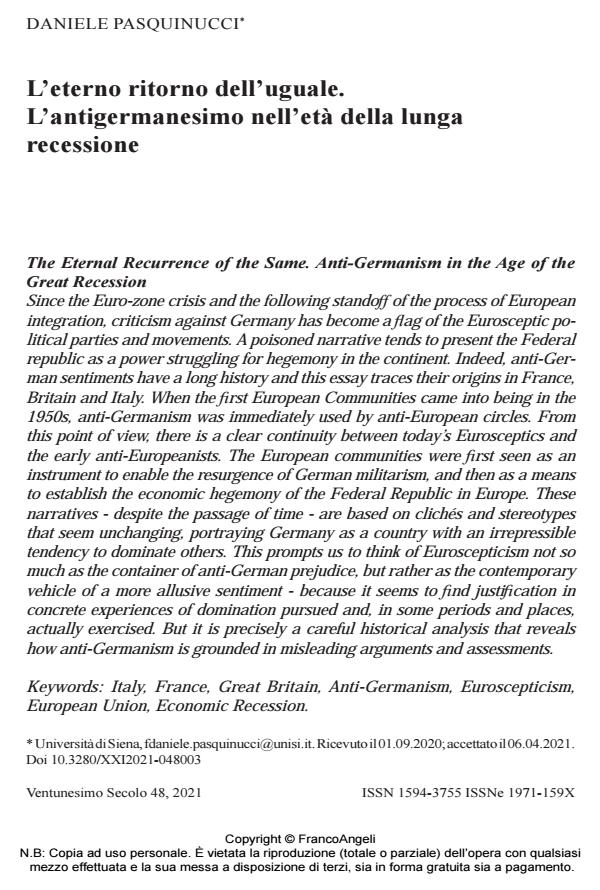L’eterno ritorno dell’uguale. L’antigermanesimo nell’età della lunga recessione
Titolo Rivista VENTUNESIMO SECOLO
Autori/Curatori Daniele Pasquinucci
Anno di pubblicazione 2021 Fascicolo 2021/48
Lingua Italiano Numero pagine 23 P. 36-58 Dimensione file 147 KB
DOI 10.3280/XXI2021-048003
Il DOI è il codice a barre della proprietà intellettuale: per saperne di più
clicca qui
Qui sotto puoi vedere in anteprima la prima pagina di questo articolo.
Se questo articolo ti interessa, lo puoi acquistare (e scaricare in formato pdf) seguendo le facili indicazioni per acquistare il download credit. Acquista Download Credits per scaricare questo Articolo in formato PDF

FrancoAngeli è membro della Publishers International Linking Association, Inc (PILA)associazione indipendente e non profit per facilitare (attraverso i servizi tecnologici implementati da CrossRef.org) l’accesso degli studiosi ai contenuti digitali nelle pubblicazioni professionali e scientifiche
Since the Euro-zone crisis and the following standoff of the process of European integration, criticism against Germany has become a fl ag of the Eurosceptic political parties and movements. A poisoned narrative tends to present the Federal republic as a power struggling for hegemony in the continent. Indeed, anti-German sentiments have a long history and this essay traces their origins in France, Britain and Italy. When the fi rst European Communities came into being in the 1950s, anti-Germanism was immediately used by anti-European circles. From this point of view, there is a clear continuity between today’s Eurosceptics and the early anti-Europeanists. The European communities were fi rst seen as an instrument to enable the resurgence of German militarism, and then as a means to establish the economic hegemony of the Federal Republic in Europe. These narratives - despite the passage of time - are based on clichés and stereotypes that seem unchanging, portraying Germany as a country with an irrepressible tendency to dominate others. This prompts us to think of Euroscepticism not so much as the container of anti-German prejudice, but rather as the contemporary vehicle of a more allusive sentiment - because it seems to fi nd justifi cation in concrete experiences of domination pursued and, in some periods and places, actually exercised. But it is precisely a careful historical analysis that reveals how anti-Germanism is grounded in misleading arguments and assessments.
Parole chiave:Italy, France, Great Britain, Anti-Germanism, Euroscepticism, European Union, Economic Recession.
Daniele Pasquinucci, L’eterno ritorno dell’uguale. L’antigermanesimo nell’età della lunga recessione in "VENTUNESIMO SECOLO" 48/2021, pp 36-58, DOI: 10.3280/XXI2021-048003